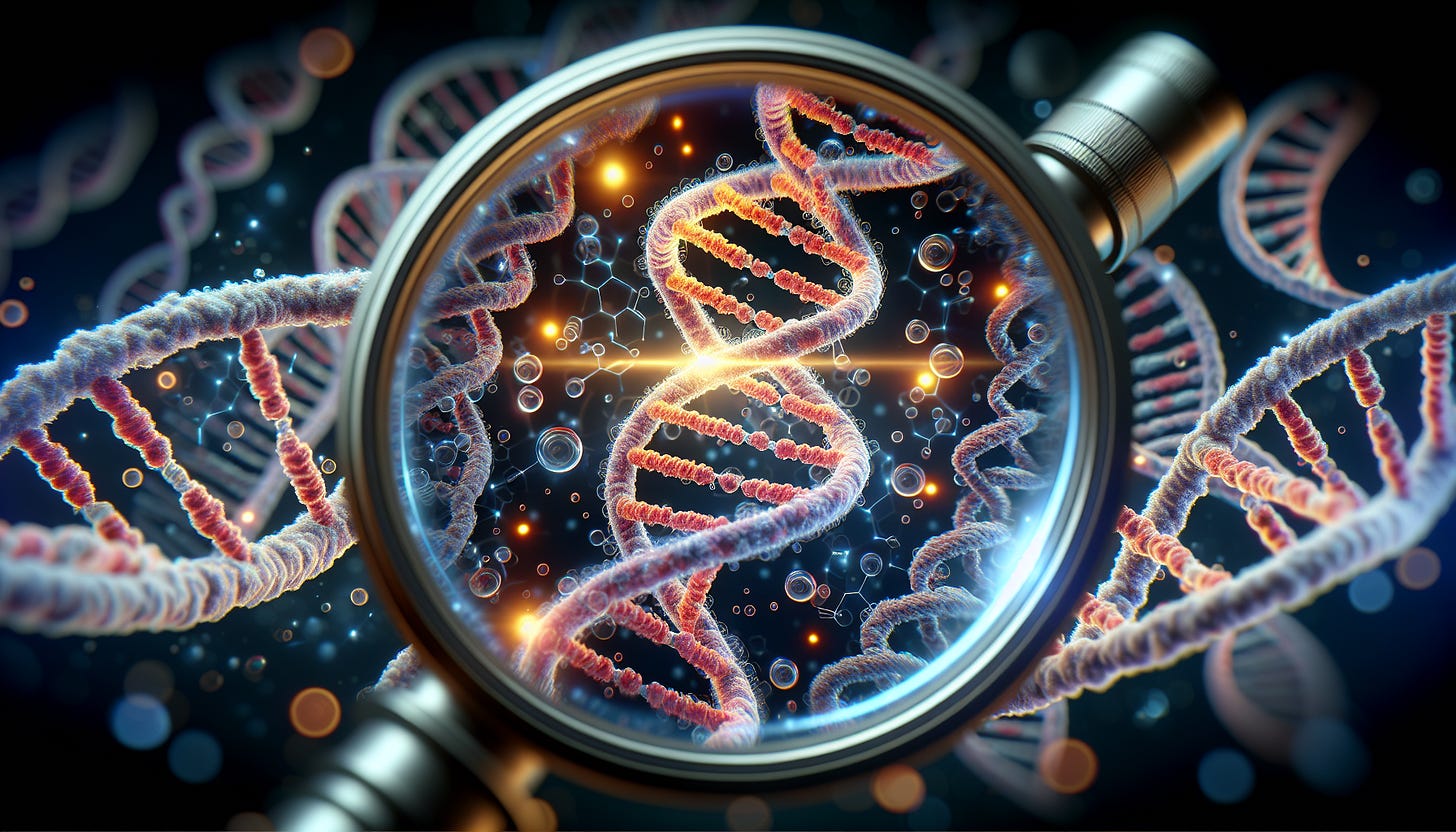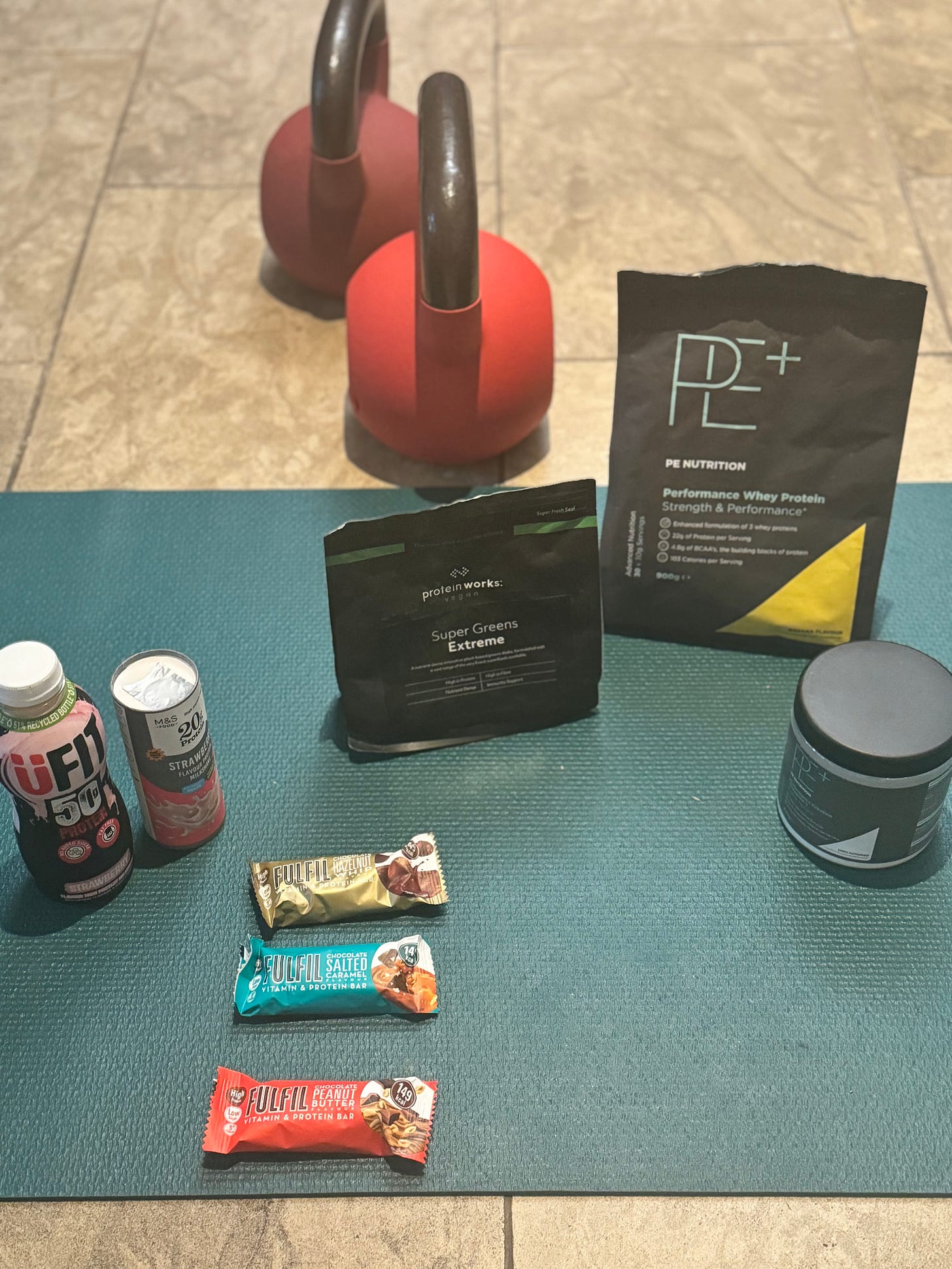Ok, this subject may seem niche, but protein doesn't get the recognition it deserves in mainstream conversations about health and well-being. In reality, protein is the building block of life, playing a crucial role in maintaining muscle mass, repairing tissues, and producing enzymes and hormones. Despite its importance, many people still underestimate the significance of it in their daily diet. This is a big mistake, one that I’ve corrected for myself and would recommend you consider doing too, if you haven’t already.
The killer stat for me is that starting at the age of 30, both men and women usually experience a 3-5% decline in their muscle mass per decade. As we age, this decline speeds up, becoming more noticeable after 60.
At 61, I have more muscle mass than I did at 30. Why? Because I made the decision to improve as I get older, not decline. One of the ways I've achieved this is to make sure I consume enough protein and train regularly to build muscle mass, improve my overall health, and enhance my physical abilities.
But please don't wait until you are 61 to start. Begin now!
Here are some of the main reasons why you need to retain and even build muscle mass, regardless of age:
1. Physical Function:
- Mobility and Strength: Maintaining muscle mass is essential for preserving mobility and strength. When muscle mass decreases, it can become difficult to carry out everyday tasks, increasing the likelihood of falls and fractures.
- Balance and Coordination: A reduction in muscle mass can impact balance and coordination, increasing the risk of falls and injuries, especially in older adults.
2. Metabolic Health:
- Basal Metabolic Rate (BMR): Muscle tissue is metabolically active, meaning it burns more calories even at rest compared to fat. A decrease in muscle mass can reduce your BMR, potentially leading to weight gain and obesity.
- Glucose Metabolism: Muscle plays a crucial role in glucose metabolism. When muscle mass is reduced, it can impair the body's ability to uptake glucose, leading to insulin resistance and increasing the risk of type 2 diabetes.
3. Overall Well-being:
- Quality of Life: Keeping your muscles strong can significantly enhance your quality of life. It helps you stay active and independent, making it easier to participate in social and sports activities and enjoy day-to-day tasks.
- Mental Health: Staying physically active maintaining preserving muscle mass can also work wonders for your mental health. Regular exercise has been proven to alleviate symptoms of depression and anxiety, leading to a happier and more balanced life.
And it's not just declining muscle mass that is linked to poor protein intake. Other risk factors include:
1. Weakened Immune System: Proteins are crucial for the production of antibodies and immune system cells. A deficiency can compromise the body's ability to fight infections and illnesses.
2. Hair, Skin, and Nail Problems: Protein is vital for the health of hair, skin, and nails. A lack of protein can result in hair thinning, brittle nails, and dry, flaky skin.
3. Edema: Protein helps maintain the balance of fluids in the body. Inadequate protein intake can lead to fluid retention and swelling, a condition known as edema.
4. Delayed Healing: Protein is essential for wound healing and tissue repair. Insufficient protein can slow down the healing process of wounds and injuries.
5. Hormonal Imbalance: Proteins play a crucial role in the production of various hormones. A deficiency can disrupt normal hormonal functions, affecting metabolism, growth, and other bodily processes.
6. Fatigue and Weakness: Protein is a source of energy. A deficiency in protein can result in ongoing fatigue and overall weakness.
7. Mood Changes: Proteins are involved in the production of neurotransmitters that regulate mood. Low protein intake can contribute to mood swings, depression, and anxiety.
Are you wondering if you're getting enough protein? If you're not, what steps should you take?
Joining the protein fan club is easier than you think, and your muscles (and taste buds) will thank you for it. Here's how you can get started:
Calculate Your Protein Needs: Aim for about 1.6-2.2 grams of protein per kilogram of body weight. Currently, I weigh 80 kg (I am 5'10") and consume around 160 grams of protein each day, which translates to 640 calories from protein. My overall calorie intake is around 2,400 calories per day.
Understanding the calorie content of various macronutrients can be quite useful. A gram of protein and a gram of carbohydrate each provide four calories. In contrast, a gram of fat packs more punch with nine calories, which is over twice as much as the other two macros.
Wondering how to determine the amount of protein in the food you eat? Most food packaging includes detailed macronutrient information, along with calorie counts. Alternatively, you can use tracker apps. I use Nutra Check Calorie Counter, which includes a convenient barcode scanner that provides macro data for most packaged foods. In the US, MyFitnessPal is a popular choice.
While I'm not a huge fan of constantly tracking calories and macros, these apps can be incredibly useful when you're starting out. They help you gain a clear understanding of what you're consuming. Over time, with experience, you will become more skilled at estimating without having to depend on tracking apps.
Eat Protein with Every Meal: Whether it's breakfast, lunch, dinner, or a snack, ensure you include a good source of protein. Think about incorporating eggs, yogurt, lean meats, fish, nuts, or protein shakes into your diet. For breakfast, I usually have a protein bagel with smoked salmon, cream cheese, tomato, and salad, and of course, a flat white from Blank Street. For lunch, I make noodles with vegetables, beef or chicken. For dinner, I cook a substantial meal consisting of fish or meat, vegetables, and salad.
Here are the approximate protein contents per 100 grams for the specified foods:
Beef: 26 grams
Salmon: 20 grams
Smoked salmon: 18 grams
Cod: 18 grams
Prawns: 24 grams
Chicken: 31 grams
Pork: 27 grams
Greek yogurt: 10-15 grams
Eggs: 1 large egg 6 grams
Lentils: 9 grams (cooked)
These values can vary slightly depending on the cut and preparation method, but they provide a good general reference.
Snack Smart: Ditch the crisps and chocolate - if you can, or at least cut back. Instead, opt for protein-packed snacks such as nuts or a protein bar that doesn't taste like sawdust. I am a big fan of Fulfil Vitamin and Protein Bars. They contain 14 grams of protein and have 149 calories. While they might not be low in calories, if you're craving chocolate, at least you're getting a decent amount of protein. In contrast, a Penguin chocolate bar contains only 1.3 grams of protein and has 130 calories.
Diversify Your Protein Sources: Variety is the spice of life and the key to a balanced diet. Mix up your protein sources to keep things interesting. Vary your meals with chicken today, salmon tomorrow, and lentils the next day to keep your muscles guessing and your palate entertained.
As I wrote about elsewhere, my passion for cooking makes the concept of batch cooking and eating the same meal every day quite unappealing. To keep things sustainable and enjoyable, it's vital to maintain a balance of normalcy and fun in meals, avoiding the trap of solely focusing on macros or energy intake.
As a result, I prepare a variety of dishes every day. I make sure to reach my protein target without consuming excess calories over three meals and a couple of snacks.
Use Protein Supplements Wisely: Protein shakes and bars are great, but don't rely on them exclusively. Use supplements to complement your whole food protein sources. A post-workout shake or a mid-afternoon protein bar can assist you in reaching your daily protein goal without becoming bored. I have a post-workout shake around 9:30 a.m. and then a shop-bought one around 4:30 p.m. My morning shake currently consists of whey protein isolate powder, super greens powder, and creatine. This amounts to 25 grams of protein. The afternoon shake is by UFit (25g) or and M&S protein shake (20g).
Stay Hydrated: Increasing your protein intake means you'll need to drink more water. Protein metabolism can be demanding, so it is important to keep a water bottle handy and stay hydrated throughout the day. Your kidneys will appreciate it. I drink around four litres of water a day, which often includes added apple cider vinegar. I also use Vidrate hydration electrolytes twice a day along with coconut water and kombucha. I have 4 cups of coffee per day, 3 are caffeinated and the evening one is decaf.
So, we've covered the amount and the ways to use protein. Here are some of the benefits of consuming the optimal amount.
Strength and Recovery: High protein intake helps repair and build muscle tissue, making you stronger and more resilient.
Satiety and Weight Management: Protein helps you feel full for longer, reducing the urge to snack mindlessly. Plus, it boosts your metabolism slightly, giving you an extra edge in weight management.
Improved Overall Health: Protein isn't just for muscles—it's essential for healthy skin, hair, nails, and even your immune system. So, you'll not only look good but also feel good.
To sum it all up, being a protein enthusiast is not merely a dietary choice; it is a dedication to living life to the fullest, with strength, vitality, and resilience. The role of protein in maintaining muscle mass, supporting metabolic health, and enhancing overall well-being cannot be overstated. As we age, prioritising protein becomes even more crucial in combating the natural decline in muscle mass and preserving our quality of life.
From improving physical function and metabolic health to boosting mental well-being, the benefits of adequate protein intake are profound. Protein is essential not only for muscle building but also for a healthy immune system, glowing skin, and balanced hormones. It plays a critical role in every aspect of our health, ensuring that we stay strong, active, and vibrant.
Calculating your protein needs and incorporating protein-rich foods into every meal can be a game-changer. Whether it's a hearty breakfast, a nutritious lunch, or a protein-packed snack, the key is to make protein a staple in your diet. Diversifying your protein sources and using supplements wisely can add variety and convenience to your meals, making it easier to meet your daily protein goals.
Staying hydrated and savouring the versatility and flavours of protein-rich foods can transform eating into a pleasurable and health-enhancing experience. From the strength and recovery benefits to the satiety and weight management perks, a high-protein diet supports a holistic approach to health and wellness.
So, whether you're striving to stay fit, combat the effects of ageing, or simply enjoy a delicious meal, embracing a high-protein lifestyle is a decision you won't regret. Join the protein fan club today and enjoy the endless benefits that come with it. Your body, mind, and taste buds will be grateful for the positive changes.
Here's to a healthier, stronger, and more fulfilling life, one protein-packed meal at a time!






